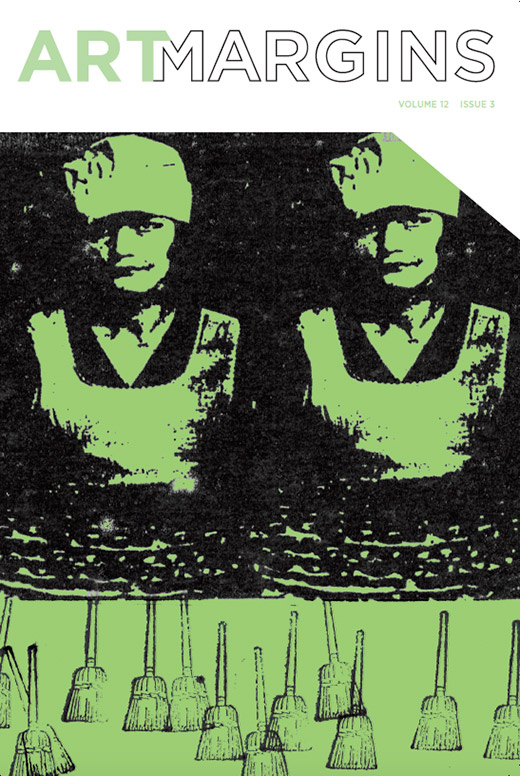Two Recent Hungarian Films
Tükrözõdések (Mirrorings) – Directed by Istvan Darday and Gyorgyi Szalai. 1998.
Presszo (Espresso) – Directed by Tamas Sas; written by Gabor Nemeth. 1998.
Tükrözõdések is an ambitious and complex experimental film by Istvan Darday and Gyorgyi Szalai. A dense pictorial compilation of the oblique memories and imageries from a dying scientist’s (Teo Fabricius) life. The scientist, suffering from the near fatal injuries of a car crash as well as an unidentified terminal Œailment’ incurred during his work in Chernobyl, has his life threatened by a doctor/Mafioso for some knowledge he possesses about the nuclear disaster. This bizarre film blurs the lines between the sensual and the trivial. It was filmed in Budapest, Venice, and New York.
Darday and Szalai’s highly imaginative workplays with the camera eye, submerged in water, as well as with the askew color quality of the film. It’s visually fluid, has a splendid bit of the grotesque, and is rampant with allegory that pushes you to think along the lines that emerge out of its fantasy. Primarily these lines are drawn from the dying/condemned man’s bizarre mystic thoughts appropriated from a mixture of Schopenhauer, Whitman, and Bela Hamvas (the Joseph Campbell of Hungary whose works were banned for forty years). His lucid mind is obsessed with time and our inability to recognize that time has texture, density, quality. To conclude the Œmirrorings’, the film has an atypical Lynchian double-ending, a chewed-up nightmare, whereby the scientist’s life ends when the doctor/Mafioso forces him into open surgery in one scene and then murders him on a bridge over the Danube in the next.
The other characters include the scientists’ girlfriend, an Opera singer, who is the film’s subject for exploration into the loss of voice and the sensation of claustrophobic immersion; and the millionaire/art philosopher who challenges the scientists speculations on life by proclaiming the reduction of art as a stick that one either uses to limp on or to beat someone up with. The film is mostly a work of atmosphere from the texture of the pictorial footage (quality of fluidity, the queasy terror of a scream, and the resonance of thermonuclear explosions). In this sense, the film reminded me of the complex of Joseph Cornell: the fear of finitudeŠ.perhaps that’s why he made those little boxes?
Presszo (Espresso), the new script by one of Hungary’s contemporary prose poets, Gabor Nemeth, is a comedy about the Budapest café life. Directed by Tamás Sas, the entire film is literally set at one coffee table (the camera’s assumed posture is that of another stool at the table) in a Budapest minimalist presszo. The Presszo — with its neon sign flickering outside and its steel facade below the upper floors of Budapest’s neo-classical architecture– is the perfect site to capture the slightly underexposed efficiency of the city. The charm of the film is the way it captures the authentic kitsch and cynical quality of ordinary life in urban Eastern Europe. The brevity of the scenes (accomplished with the splicing of the red filtered shot of typical dilapidated urban facade with a excerpt of the script typed across the screen) reminded me of the wonderful manner of One Minute Stories by Hungarian literature’s master of the absurd, István Örkény. As with the marvelous work of Örkény, confusion is rampant in Nemeth’s wry sketches where nothing is at is seems, especially in the gossip, innuendoes, and social rituals of cosmopolitan life in Budapest. The absurd and the inexplicable found gliding beneath the surface in this Budapest cafe are exemplified in the characters’ attitudes towards the sex, murder, work, and the Mafia.
Hysterical performances of totally unscrupulous characters (yet, it is the extreme unscrupulous schemes the characters come up with that give them their redeeming qualities) entangled in a most pathetic ring of sexual liaisons. The film moves incredibly well by the sheer ridiculousness of the dialogue and the the cast delivery of the script. The characters include three women (Andrea Söptei, Andrea Fulljtár, and Karina Kecskés), the pathetic seducer, a hit man, the professor/Mafioso godfather, the Presszo owner, one prude jealous husband, and a brilliant sadistic elderly female psychiatrist. One scene that easily could have been written by the Master of the Absurd himself entails the stupefied presszo owner dealing with a soliciting detergent salesmen (truly a likely reaction in Budapest to this truly bizarre capitalist phenomenon). Not surprisingly, the soap man’s countenance turns to a disgusted rage when he discovers this successful entrepreneur Presszo owner was his childhood classmate. The insult is so great for him that he refused the free drink he is offered and storms out. The film is Kafkaesque in the sense that just when one thinks ordinary experience can’t get anymore absurd, it does.




